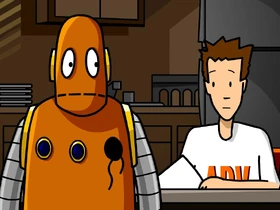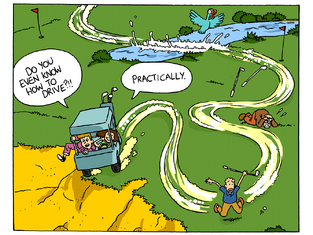| Adverbs | |||
|---|---|---|---|
 | |||
| Airdate | August 25, 2002 | ||
| Curriculum | English | ||
Adverbs launched in BrainPOP English August 25, 2002.
Summary[]
Moby has lost his third light. Tim answers a letter and discusses about adverbs with Moby. In the end, Tim claims that his sneakers are too high.
Appearances[]
Transcript[]
Quiz[]
Quotes[]
FYI's[]
Quirky Stuff[]

“The pH is too low,” Tom said acidly.
“I’ll have these ropes off in a second,” Tom said loosely. (pictured)
“Winter is my least favorite season,” Tom said coldly.
“I’ve struck oil,” Tom said crudely.
“You have the right to remain silent,” said Tom arrestingly.
“I love hot dogs,” Tom said frankly.
These are all examples of Tom Swifties, a word game that derives humor out of the creative use of adverbs. They take their name from Tom Swift, a character in a series of boys’ adventure novels from the first half of the 20th century.
Tom was created by Edward Stratemeyer, the same guy who came up with the Hardy Boys, Nancy Drew, and the Bobbsey Twins. The novels, in which Tom zipped about on his motorcycle, fought pirates, and traveled to outer space, were written in a breathless, adverb-heavy style that was rather easy to spoof. See if you can come up with your own Tom Swifties!
The Final Frontier[]

These are the voyages of the starship Enterprise. Its 5-year mission: to explore strange new worlds, to seek out new life and new civilizations, to boldly go where no man has gone before.
If you’ve ever seen the original Star Trek television series, you’re probably more than familiar with these famous words. They define the 50-year-old franchise—one that boasts more than 700 total TV episodes and over a dozen feature films. Even if you’re not a huge fan, the sentences are sure to ring a bell as they’ve become part and parcel of American pop culture. But, these lines are often as infuriating to grammarians as they are inspiring to true Trekkies.
"To boldly go" is a split infinitive. An infinitive is a verb's basic form. It's created by placing a "to" before the root verb. Thus, the infinitive of the verb "go" is "to go." When you insert an adverb, like “boldly” in between, you’ve split the infinitive. Grammar hardliners, and most teachers, consider this a serious no-no.
Despite their impassioned pleas, there is no definite rule prohibiting these splits. The issue is more a matter of style.
So why the bias? In the early days of English, Latin was seen as the ideal language. The first books about the rules of English were written in Latin and modeled on Latin instructional texts. These scholars wanted English to emulate the classical language in as many ways as possible.
How were infinitives treated in Latin? You guessed it… as one word. Without multiple parts, there was nothing to split. So early grammarians insisted that English infinitives function in the exact same way—as one solid, unbreakable word.
More than 400 years later, this initial love for Latin still holds sway. The Chicago Manual of Style, used by most students and academics, continues to advise against splitting infinitives. And in most cases, this usually does sound smoother and smarter. But any great writer will tell you that sometimes it’s better to boldly go against time-honored traditions than to just go along with the crowd.
Language[]

As Tim mentions in the movie, an “ly” ending doesn’t necessarily mean that a word is an adverb. Here are some common adjectives that end that way.
- Friendly
- Likely*
- Elderly
- Lovely
- Daily
- Early
- Lively
- Monthly
- Silly
- Ugly
- Deadly
* Sometimes used as an adverb, but more often as an adjective
Etc.[]

Adverbs can be tricky little buggers! Here are some extra tips to help you use these words wisely.
- All question words (what, why, where, when, how) can be used as adverbs.
- Placing adverbs as close as possible to the words or clauses they modify helps clarify your meaning. Worse: “I had considered becoming a doctor often.” Better: “I had often considered becoming a doctor.”
- You can join two clauses together with conjunctive adverbs like however, also, hence, therefore, meanwhile, and thus. For example, (as pictured above): “Tim was running a very high fever; therefore, he stayed home from school.”
- When an adjective ends in “y,” its adverb form will end in “ily:” hungry > hungrily; scary > scarily; happy > happily; angry > angrily
- In some cases, adverbs modify nouns. This is probably most common with gerunds, which are “ing” nouns formed from verbs. For example: “Eating quickly can give you a stomach ache.” The adverb “quickly” modifies the noun “eating.” Even though nouns are usually modified by adjectives, using “quick” in that sentence would be incorrect.
FYI comics[]

